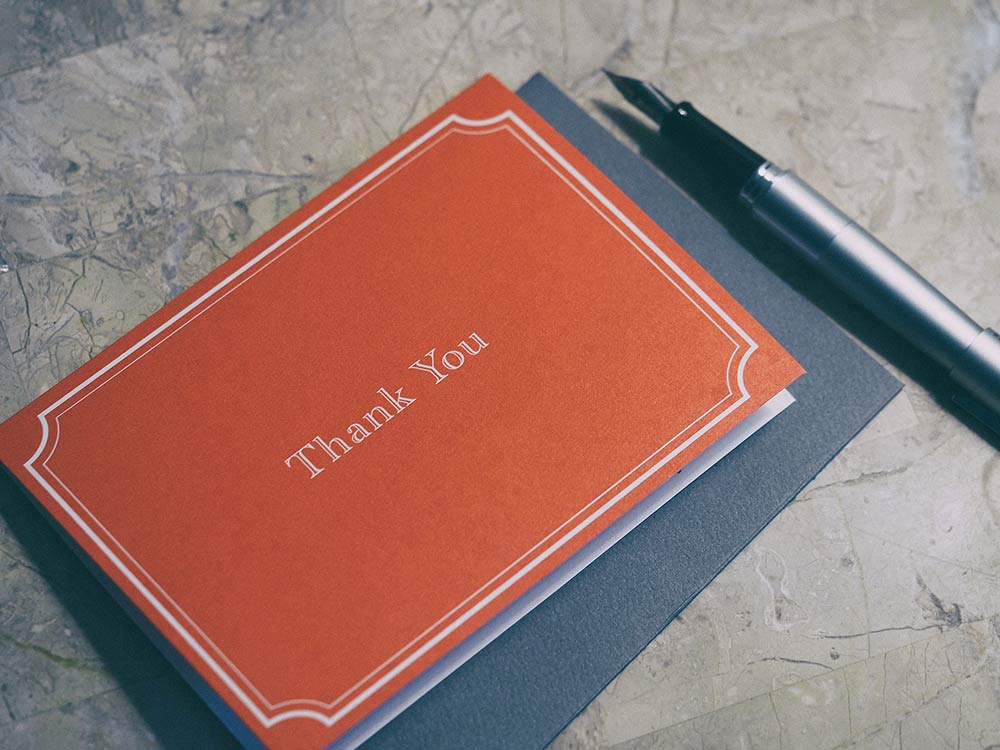I was having coffee with three friends not long ago and we had an interesting discussion about the topic of gratitude and specifically, thank you notes. I shared with them that I had recently received a wonderful handwritten thank you note from a mentee of mine. I shared how I knew this young professional, what development areas we were working on and what specifically had prompted the note. When I finished, I asked each of them to share a little about the last handwritten thank you note they had received and exactly how they felt when they received it.
What struck me as interesting was the warm smile each of them had as they described the note and who it was from, why they had received it and the positive way the note made them feel. I then asked them to describe the last thank you message they had received via email or text. The difference in their responses was markedly different. They were truly appreciative of the thank you messages, but their descriptions were more perfunctory and these messages were deleted along with the other read emails or text messages they received that day. It is also interesting to note that each of them keeps the handwritten thank you notes they receive. I practice the same habit and have a box of them in my home office.
Why is this relevant?
I have long shared with clients, friends, college students and young professionals the importance and value of the handwritten thank you note. I know it sounds old-fashioned, but this is one of the best ways to make a favorable impression on another person. Emailed and texted thank you messages are nice, but soon deleted and forgotten. Handwritten notes are memorable. As I shared, I have kept every handwritten note that I’ve ever received. Thank you notes are special and I read them (and reread them) and it makes me think warmly about the other person…which is really the whole point.
If you want to be viewed more positively than your colleagues at work as you look to advance in your career or fare better than others interviewing for jobs you are interested in, consider the power and impact of the simple handwritten thank you note. I can share from experience and observation that the extra effort and thoughtfulness associated with this once common tradition makes you stand out favorably in the eyes of the recipient. Wouldn’t you like to have been one of the individuals positively discussed in the coffee meeting I mentioned with my friends, all of whom are senior business leaders?
Not everything is worthy of a handwritten thank you note and in fact, the majority of the time emailed and texted thank you messages are more than sufficient (especially for employees of global companies). I certainly send my share of gratitude via email and text each week. We should also be consistently expressing our sincere thanks verbally and in the moment…which is hopefully a given. But, every now and then, an impactful encounter, helpful conversation or kind act will merit the investment of time in a heartfelt and thoughtful written note of gratitude sent in a timely manner. What actually merits a handwritten thank you note? In my opinion, here are some relevant examples:
- After every first interview and if you accept a job offer. All interviewers and your new boss should receive a handwritten note of thanks from you.
- When a busy senior leader makes time to meet with you to further your development.
- If you receive a promotion or unexpected pay raise.
- When you receive wise and impactful counsel from a work colleague or friend.
- ALWAYS after receipt of an unexpected gift and all gifts received on your special days.
- In response to any acts of kindness where someone has gone out of their way to do something special and helpful for you.
- When someone commits a truly selfless act, shows courage or demonstrates sincere care and concern for others, send a thank you note to acknowledge their goodness…even if it didn’t directly impact you.
- If you hear a great speaker or read something by an author that really impacts you, send them a note if you can find their address.
- Send handwritten thank you notes to customers and clients sharing your appreciation for their business and partnership.
- Write thank you notes to your employees and colleaguesa few times a year, especially at Thanksgiving, to express how much you appreciate them and thank them for some specific aspect of their performance when appropriate.
Seven helpful tips to elevate your practice of sending handwritten thank you notes:
- Invest in quality stationary, personalized if possible
- Be specific. Avoid vagueness and share exactly what prompted your note and why you are grateful.
- Be careful with spelling, grammar and penmanship. I know this is obvious, but be very careful with spelling, grammar and neatness and ask someone you trust to proof your note if possible. A handwritten note that misses the mark in these areas can work against you and leave a poor impression. Idea: if you are concerned about your penmanship, you might try typing a short letter to include in your thank you card and signing the bottom of the note. Handwritten is always best, but I have seen this alternative and it is a suitable replacement if necessary.
- Be a good detective and track down their address. Corporate addresses are easily available online. If the individual works from home (this is obviously more common these days), politely ask them for their address and let them know you plan to follow up. If this feels a little uncomfortable, reach out to their Administrative Assistant if they have one and ask for the address. Also, if you really want to make a positive impression on a senior leader, drop the handwritten note off in person at their office the next day with their Assistant (if this is geographically possible).
- Have a goal of at least four handwritten thank you notes per month. If we are paying attention and acting with intention, we should be able to find appropriate reasons to send at least four handwritten thank you notes a month.
- Remember that this is a best practice regardless of your generation, experience level or title.
- Take a moment and consider how you are making the other person feel with your note. This perspective goes beyond how it affects you. You are showing them gratitude and appreciation which might just be the best thing that happens to them that particular day when your note arrives. Our thoughtful thank you notes, therefore, can also be an act of kindness.
You may read this post and decide the whole idea of handwritten thank you notes is too old fashioned, a waste of time or you are simply too busy. I understand and respect your perspective. But, you may read this post and see the value of the concept or already make this a regular practice. Maybe you are reflecting right now on the written thank you notes you have received in the past and the positive impressions they made on you. Maybe you are a little stuck and looking for a competitive edge to grow your career. Perhaps you are a job seeker looking to distance yourself from the competition chasing the opportunities you are interested in. Hopefully, you see the best reason of all to send more thoughtful handwritten notes: it is warmer, more personal, more meaningful and clearly more memorable than the email or texted thank you messages that have been your primary go-to practice up until now.
One more thing… at the end of his section in Tim Ferriss’s highly acclaimed and successful book Tools of Titans, author and leadership/marketing guru Seth Godin is asked, “Any final words of advice?” He says, “Send someone a thank you note tomorrow.”
Seth Godin could have left us with anything, but he chose this simple call to action to thoughtfully end his chapter. Godin is right and I strongly encourage you to give it a try.
Good luck.






